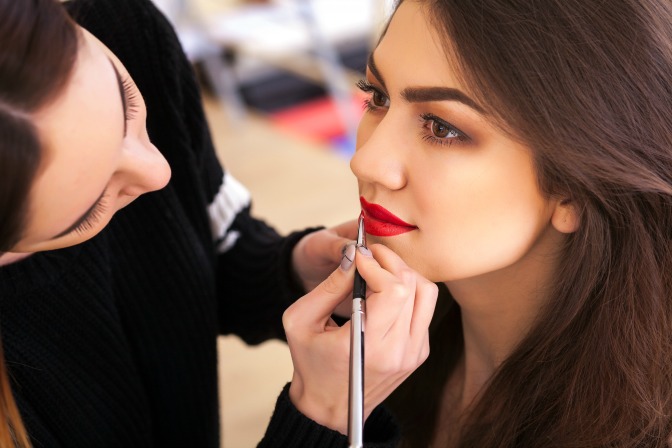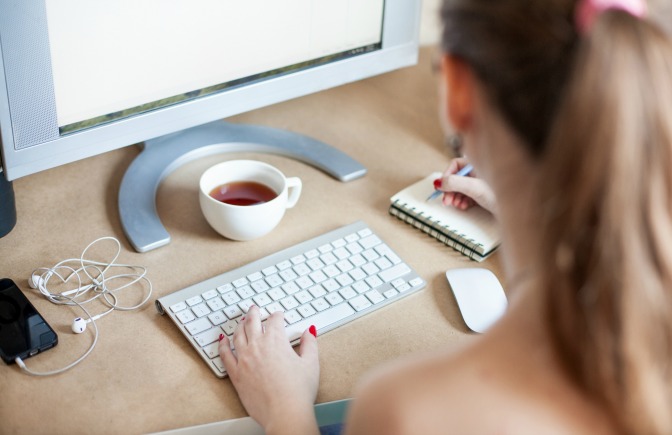Kayla Wilson is a San Diego-based QC student enrolled in our Master Makeup Artistry program. Last year, Kayla landed a makeup artistry gig for La Catrina live on CBS. As a member of the deaf and hard of hearing community, Kayla faces a unique challenge when she communicates with clients. In this guest post, Kayla discusses how she balances hearing impairment with life as a busy freelance makeup artist!
It’s hard to explain what living in a completely hushed world is like.
When people ask the question, “What does it sound like to you?” I don’t have a straight answer. My audiologist said that what you hear as normal conversation sounds like a whisper to me; and upper registers are relatively inaudible unless they are excessively loud (think: live amplified music, or sirens in the city, but they have to be close!). It is a common misconception that with the loss of a sense, another is strengthened, for example eyesight or your sense of smell—but observations of visual cues do become more acute.
 Makeup Artistry is an avenue of artistic expression through its transformative capabilities, and I find my inspiration in couture and fantasy makeup…but not in the process of developing or executing the looks. My inspiration comes from knowing what is going to happen once an individual sees their reflection in the “after” moments of makeup ingenuity—it is always incredibly moving to watch an individual’s reaction to what they see in the mirror, and how suddenly a switch of perspective occurs. To me, this progression of evolution through makeup is absolute magic.
Makeup artistry, due to being entirely a visual medium, is incredibly accessible to those who are Deafened or Hard of Hearing, and I’d make the case for it being advantageous. With models, I am able to connect very quickly with them as the proximity of the work to the body is obviously close, and being naturally more aware of visual cues means that I’m able to immediately read what is happening in the chair, whether they are nervous or relaxed; unhappy or happy—without a word.
At particularly large gigs, I’ve noticed that while the individuals around me are usually anxious or distracted, I’m usually fairly calm—and it’s because the ambient noise doesn’t distract me, allowing for my creative space to have sustained focus. One of my professional inspirations is Deaf Makeup Artist Tia Albert—you can click here to watch her amazing interview on Deaf Women in Film.
Makeup Artistry is an avenue of artistic expression through its transformative capabilities, and I find my inspiration in couture and fantasy makeup…but not in the process of developing or executing the looks. My inspiration comes from knowing what is going to happen once an individual sees their reflection in the “after” moments of makeup ingenuity—it is always incredibly moving to watch an individual’s reaction to what they see in the mirror, and how suddenly a switch of perspective occurs. To me, this progression of evolution through makeup is absolute magic.
Makeup artistry, due to being entirely a visual medium, is incredibly accessible to those who are Deafened or Hard of Hearing, and I’d make the case for it being advantageous. With models, I am able to connect very quickly with them as the proximity of the work to the body is obviously close, and being naturally more aware of visual cues means that I’m able to immediately read what is happening in the chair, whether they are nervous or relaxed; unhappy or happy—without a word.
At particularly large gigs, I’ve noticed that while the individuals around me are usually anxious or distracted, I’m usually fairly calm—and it’s because the ambient noise doesn’t distract me, allowing for my creative space to have sustained focus. One of my professional inspirations is Deaf Makeup Artist Tia Albert—you can click here to watch her amazing interview on Deaf Women in Film.
 I am currently employed professionally in the performing arts, and the makeup hustle often bleeds over into my digital communications career. In the past, I’ve been featured on live television doing makeup, and tapped by actors and musicians in my networks to help them with stage-readiness. I’ve been fortunate enough to maintain clients via word-of-mouth—but in order to really maximize business opportunities, I need to dedicate time toward strengthening my social media game and portfolio work.
Admittedly, I have no plans to turn up the heat on self-promotion until my Master Makeup Certification with QCMUA is completed: 40-hours per week at work, full-time college, finishing my makeup certification, and taking on word-of-mouth freelance clients is more than enough work for now, and time will tell what my future holds in the industry.
I am currently employed professionally in the performing arts, and the makeup hustle often bleeds over into my digital communications career. In the past, I’ve been featured on live television doing makeup, and tapped by actors and musicians in my networks to help them with stage-readiness. I’ve been fortunate enough to maintain clients via word-of-mouth—but in order to really maximize business opportunities, I need to dedicate time toward strengthening my social media game and portfolio work.
Admittedly, I have no plans to turn up the heat on self-promotion until my Master Makeup Certification with QCMUA is completed: 40-hours per week at work, full-time college, finishing my makeup certification, and taking on word-of-mouth freelance clients is more than enough work for now, and time will tell what my future holds in the industry.
My Experience with Hearing Loss
Most have absolutely no clue that I have lost the majority of my hearing capabilities, as I’ve adapted well to Hearing Culture, and it hasn’t hindered my successes—albeit occasionally struggling day-to-day. I was raised in a Hearing family, am obtaining my formal collegiate education on an Orally traditional campus, and have learned to work with few accommodations. Clues to others become apparent when they attempt to have a conversation without direct eye-contact—especially around the office or in class. If I can’t see someone’s face or read body language, I can’t “hear” what is being said. I utilize AHDs (Assisted Hearing Devices) in live-entertainment environments, and need Closed Captioning for most film experiences as SFX has taken precedence over having a camera on an actor’s face during dialogue.The Art of Makeup
 Makeup Artistry is an avenue of artistic expression through its transformative capabilities, and I find my inspiration in couture and fantasy makeup…but not in the process of developing or executing the looks. My inspiration comes from knowing what is going to happen once an individual sees their reflection in the “after” moments of makeup ingenuity—it is always incredibly moving to watch an individual’s reaction to what they see in the mirror, and how suddenly a switch of perspective occurs. To me, this progression of evolution through makeup is absolute magic.
Makeup artistry, due to being entirely a visual medium, is incredibly accessible to those who are Deafened or Hard of Hearing, and I’d make the case for it being advantageous. With models, I am able to connect very quickly with them as the proximity of the work to the body is obviously close, and being naturally more aware of visual cues means that I’m able to immediately read what is happening in the chair, whether they are nervous or relaxed; unhappy or happy—without a word.
At particularly large gigs, I’ve noticed that while the individuals around me are usually anxious or distracted, I’m usually fairly calm—and it’s because the ambient noise doesn’t distract me, allowing for my creative space to have sustained focus. One of my professional inspirations is Deaf Makeup Artist Tia Albert—you can click here to watch her amazing interview on Deaf Women in Film.
Makeup Artistry is an avenue of artistic expression through its transformative capabilities, and I find my inspiration in couture and fantasy makeup…but not in the process of developing or executing the looks. My inspiration comes from knowing what is going to happen once an individual sees their reflection in the “after” moments of makeup ingenuity—it is always incredibly moving to watch an individual’s reaction to what they see in the mirror, and how suddenly a switch of perspective occurs. To me, this progression of evolution through makeup is absolute magic.
Makeup artistry, due to being entirely a visual medium, is incredibly accessible to those who are Deafened or Hard of Hearing, and I’d make the case for it being advantageous. With models, I am able to connect very quickly with them as the proximity of the work to the body is obviously close, and being naturally more aware of visual cues means that I’m able to immediately read what is happening in the chair, whether they are nervous or relaxed; unhappy or happy—without a word.
At particularly large gigs, I’ve noticed that while the individuals around me are usually anxious or distracted, I’m usually fairly calm—and it’s because the ambient noise doesn’t distract me, allowing for my creative space to have sustained focus. One of my professional inspirations is Deaf Makeup Artist Tia Albert—you can click here to watch her amazing interview on Deaf Women in Film.
A Hardworking MUA
 I am currently employed professionally in the performing arts, and the makeup hustle often bleeds over into my digital communications career. In the past, I’ve been featured on live television doing makeup, and tapped by actors and musicians in my networks to help them with stage-readiness. I’ve been fortunate enough to maintain clients via word-of-mouth—but in order to really maximize business opportunities, I need to dedicate time toward strengthening my social media game and portfolio work.
Admittedly, I have no plans to turn up the heat on self-promotion until my Master Makeup Certification with QCMUA is completed: 40-hours per week at work, full-time college, finishing my makeup certification, and taking on word-of-mouth freelance clients is more than enough work for now, and time will tell what my future holds in the industry.
I am currently employed professionally in the performing arts, and the makeup hustle often bleeds over into my digital communications career. In the past, I’ve been featured on live television doing makeup, and tapped by actors and musicians in my networks to help them with stage-readiness. I’ve been fortunate enough to maintain clients via word-of-mouth—but in order to really maximize business opportunities, I need to dedicate time toward strengthening my social media game and portfolio work.
Admittedly, I have no plans to turn up the heat on self-promotion until my Master Makeup Certification with QCMUA is completed: 40-hours per week at work, full-time college, finishing my makeup certification, and taking on word-of-mouth freelance clients is more than enough work for now, and time will tell what my future holds in the industry.

This is great! A lot of this article has a lot of truth for me as I am hard of hearing too.
I have a mid range hearing loss which affects the area where human speech falls into but my hearing aids help greatly with this. Being in close proximity does help with the communication with clients but background noise can be an issue for me as I can hear high and low sounds well.
Doing my makeup courses (MMA and SFX) via correspondence was the best decision as most of the material is in text and I can replay the video over areas again and again if I miss something which doesn’t happen often (the SFX videos have great sound).